



THE MEMBERSHIP MAGAZINE FOR THE BRITISH PARKING ASSOCIATION



Find out about your new representatives (page 35)









The National Parking Platform is rolling out –with the BPA in the driving seat





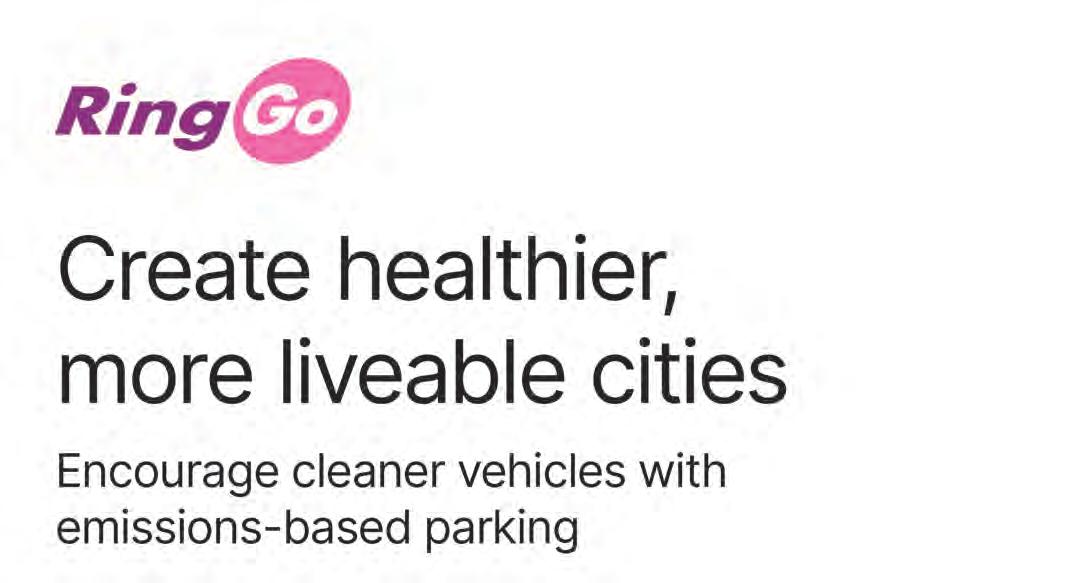










Find out about your new representatives (page 35)









The National Parking Platform is rolling out –with the BPA in the driving seat








Welcome to this brand-new issue of Parking News. Thank you to everyone who attended and exhibited at Parkex at the CBS Arena in May – what a great few days it was, once again cementing its position as the premier parking show in Europe. Thank you also to everyone who turned out to play at the Vice President’s Golf Day, which helped raise much-needed funds for our new charity partner, the Motor Neurone Disease Association. We are delighted to be supporting such a worthwhile organisation and look forward to a fruitful partnership over the next three years. We hope you will join in the fundraising efforts, both at BPA events and in your workplaces.
Fast forward to July, and it is a huge privilege for me to step into the role of President of the Association, especially at the second time of asking. I am truly honoured to be trusted with this position and to represent the BPA community as your ambassador. I cannot wait to get started and hope to see many of you at my reception, sponsored by APN Group, at the House of Commons in July.
This promises to be a significant year for our sector. The government has confirmed that the BPA will take forward the development and running of the National Parking Platform with a consortium of industry leaders. The new consortium will be onboarding more local authorities imminently to ensure that easier, simpler parking is rolled out to more drivers as soon as possible.
This announcement marks the result of six years of dedicated work by our sector to make paying for parking easier. We’ve strongly supported the National Parking Platform from the start, so we’re thrilled with this outcome and excited to collaborate with the Department for Transport and the new NPP company to create a better parking experience for all drivers.
Additionally, the Private Parking Scrutiny and Advice Panel (PPSAP) continues to review the Single Sector Code of Practice, having identified several priority areas. This is in advance of the Government committing to consulting further with the sector and stakeholders and publishing its Private Parking Code soon. We look forward to working with government to achieve a successful outcome for all concerned.
It is a huge privilege for me to step into the role of President of the Association


Mike Marrs President Elect, 2025-26 linkedin.com/company/ british-parking-association

Parking News is published by
on behalf of the British Parking Association
Editor Sophie Vening editor@britishparking.co.uk
Advertising Oliver Willison oliver.willison@ jamespembrokemedia.co.uk
T: 0203 198 3092
Production editor Lizzie Hu on
Design and production
manager Christina Richmond
Publisher James Houston
Circulation and administration
Linda Page linda.p@britishparking.co.uk
Print Stephens & George Print Group

We would like to remind our readers that the views expressed by any contributor to Parking News are not necessarily those of the British Parking Association or Parking News, (the editor, the editorial panel or the board). Contributions and adverts are published in good faith and no responsibility or liability will be accepted, either for their contents or accuracy, or for any action taken as a result of anything contained in Parking News



It was fantastic to meet so many of you at Parkex. The event is a brilliant showcase of the innovation, expertise, and dedication that drives the sector forward. A personal highlight was sitting down with MP Lilian Greenwood to discuss her views on the future of parking and transport (see p11).
This issue is packed with insights from across the industry. We take a closer look at bay blocking and explore possible solutions to improve access and fairness (p14). There’s also a spotlight on how the BPA is supporting members to stay ahead through professional development programmes (p18), while this issue’s Roundtable debates whether pavement parking should be banned nationwide (p22).
Parking News is here to champion your work and share the stories that shape our industry. I hope you enjoy the issue and, if you have any comments, please email me at editor@britishparking.co.uk
Sophie Vening Editor
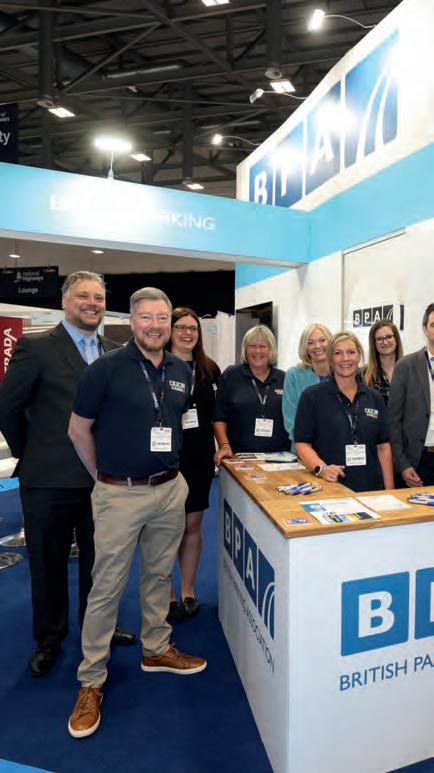
SHARE YOUR STORIES contact editor@ britishparking .co.uk

18

22 14

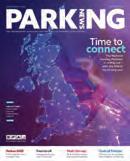
© British Parking Association 2025 ISSN 1470-8361 < ON THE


page 9








08 | Parkex 2025
Parking News editor Sophie Vening shares some of the highlights from the biggest event in the UK parking sector
14 | Bye bye bay blocking
The impact of bay blocking and the measures which can help prevent it
18 | Empowering people, elevating excellence
How the BPA is supporting members through its professional development programmes and pathways
22 | Roundtable: Should pavement parking be banned nationwide?
Operators and campaigners discuss whether England and Wales should follow Scotland in a total ban
29 | Best practice
The new mid-stay car park at Gatwick Airport’s North Terminal

6 | Digest
Full steam ahead for NPP, NPED’s Drive Legal campaign, plus updates from across the private and public sectors
27 | Legal view
How to start preparing now for a consultation on the Government’s proposed Code of Practice
31 | Parking people
Meet Sarah Randall, the new interim chief executive of the National Parking Platform
35 | BPA updates
Election results, events updates and other key news from the BPA
42 | Park life
Kelvin Reynolds on the subtle di erences between parking organisations – and what makes the BPA stand out
38 | Marketplace
43 | Specialist services




















Find out what happened at


The BPA, together with a consortium of BPA members, will lead the development and delivery of the National Parking Platform (NPP), a new system which will enable drivers to pay in all participating car parks through their preferred parking app, providing drivers with a more flexible parking experience. The UK government has stated that the platform will be delivered at no additional cost to the taxpayer and operated on a notfor-profit basis.
FIND OUT MORE in this month’s exclusive interview with the NPP’s new interim CEO Sarah Randall on page 31
NPED has launched Drive Legal, a national campaign tackling the UK’s hidden danger of over 10 million non-compliant vehicles. Issues include no MOT, insurance, or tax, unregistered or cloned plates, and foreign vehicles exceeding the sixmonth limit. These vehicles pose safety risks, fuel criminal activity, and cost taxpayers millions. Drive Legal urges parking operators and the public to join the movement for fairer, safer roads. “Through collaboration, education, and reform, we can address this growing issue and create a more compliant road network that works for everyone,” says Alan Wood, representative for Drive Legal.
RTA Associates launches a streamlined DTRO management solution for highway authorities
Consultancy RTA Associates has unveiled RTA OrderPro, a managed service designed to host and update digital traffic regulation orders (DTROs). It offers a cost-effective solution that supports highway authorities by providing robust business continuity in managing DTROs – freeing up internal teams to focus on frontline operations.
Developed by traffic engineers, RTA OrderPro is a Digital Service Provider (DSP) to the Department for Transport’s DTRO hub and is currently participating in the private and public beta phase of the project.
In a significant step forward, RTA OrderPro has created an innovative DTRO conversion tool for DfT’s DTRO hub for Highway Authorities that do not wish to engage a DSP but still need to upload mapped orders from their corporate GIS software to the DfT’s DTRO hub. The convertor tool accepts all GIS file types and supports every kind of traffic order including, Temporary Traffic Regulation Orders (TTRO’s), experimental, static, moving, offstreet, and even non-TRO’s.
FIND OUT MORE
Visit rtaassociates.co.uk

Believ is installing seven 22kW EV charge points across six residential car parks in Luton this autumn, with the potential to expand to 24 units as demand grows. Funded by Believ with council support to lower charging costs, the project aims to improve access for residents without home chargers.
Chosen for its expertise in accessible infrastructure, Believ’s solution meets PAS 1899 standards and supports Luton Council’s net zero and sustainable transport goals.
named exclusive cashless parking provider in three
PayByPhone has been appointed as the exclusive mobile parking payment provider for South Oxfordshire District Council, Vale of White Horse District Council – as appointed by Saba UK – and Powys, Wales.
The new contract for South Oxfordshire and Vale of White Horse covers 26 off-street locations via 49 parking machines, while the option to pay for parking via mobile phones is available at all Powys County Council’s pay and display car parks, offering a simplified, app-based payment experience across all three regions.

The Department for Transport has confirmed it will not be revising the cost of parking and traffic penalty charges (PCNs) issued by local authorities in England and Wales. “The BPA and PATROL have written to the DfT to ask for an urgent meeting to discuss this as the evidence mounts that the status quo is unsustainable,” says Isaac Occhipinti, BPA head of external affairs.
APCOA launches barrierless parking at MAGs Airports
APCOA is now the official parking partner at Manchester, London Stanstead and East Midlands airports, introducing barrier-less forecourt technology.
Croydon cracks down on Blue Badge fraud
Croydon Council is launching a borough-wide crackdown on Blue Badge fraud, including fines, court action and vehicle towing.
Vaylens launches contactless EV charging payment solution UK-wide EV-charging software brand Vaylens, part of the KOSTAL GROUP, has launched vaylensPay, a contactless card payment terminal now available UK-wide. Aimed at charge point and public parking operators, vaylensPay supports new regulations requiring all public EV chargers over 8kW to offer contactless payment. The terminal connects multiple chargers to a single unit, reducing infrastructure costs and simplifying installation. Integrated with Planet’s secure payment solutions, it offers a seamless user experience. “VaylensPay delivers a smarter, more scalable alternative, helping operators meet compliance,” says Russell Oliver, UK director at Vaylens. The solution is now available to all charge point operators across the UK.



Parking News editor Sophie Vening reports on the leading event for parking professionals: what was on show, the keynote from the Minister for the Future of Roads Lilian Greenwood and the John Heasman Innovation Awards
Parkex 2025 did not disappoint. Held at the Coventry Building Society Arena, the industry-leading event brought together professionals from across the sector for two dynamic days of debate, insight, innovation and networking. As a firsttime attendee, I was struck by the energy, forward thinking and genuine passion that filled the venue.
The agenda this year tackled some of the most pressing issues facing the sector, including accessibility and inclusivity in parking management, the implementation of the Private Parking Code, the design and security of parking structures and the protection of frontline o icers, to name but a few. Delegates were also treated to forward-looking discussions around wider mobility,
thanks to co-located events Tra ex, EVEX and Cold Comfort.
A major highlight was the appearance of the Parliamentary Under-Secretary of State (Minister for the Future of Roads), Department for Transport, Lilian Greenwood, who delivered a longawaited and significant announcement regarding the National Parking Platform (NPP). The government-backed initiative, which aims to simplify the user experience by enabling payment for parking through a single app nationwide, is finally being rolled out – with the BPA and a consortium of its members at the helm of its development and operation.
You can read her full keynote on page 9.
Parkex 25 was o icially opened by BPA president Richard Walker and BPA chief engagement o icer Alison Tooze, who outlined the packed schedule and
strategic focus of the show. Presentations took place at the BPA Live Theatre and EV Connect Theatre, with sessions ranging from data-driven insights to accessible EV charging. Hot topics included:
∞ How does the parking sector support an Integrated National Transport Strategy?
∞ Driving impact: Key metrics and data to power the private parking message
∞ Navigating the complexities of EV infrastructure funding and delivery
∞ All you need to know about making EV charging truly accessible
One of the most talked-about subjects featured at the event was the Beyond the Uniform campaign, a vital initiative led by Brighton & Hove City Council and the North Essex Parking Partnership (NEPP), and funded by Parking and Tra ic Regulations Outside London (PATROL). Designed to address the rising abuse faced by parking enforcement o icers and other frontline workers, the campaign shines a spotlight on the

essential role enforcement o icers play in maintaining road safety, facilitating emergency vehicle access and ensuring the protection of disabled parking spaces. A packed session in the Learning Lab: Protection of Frontline O icers shared updates on the campaign’s impact and key takeaways for adoption across England and Wales.
Another focal point at Parkex was the Private Parking Code of Practice, a joint industry code and collaboration between the BPA and International Parking Community (IPC) regarding the rules around grace periods, signage and appeals in the private parking sector. We heard an update on the current situation regarding the implementation of the Government’s new single Code of Practice and associated framework – see the Legal feature on page 27.
Closed sessions for Approved Operators (day 1) and local authorities (day 2) o ered space for deeper conversations and peer networking. Whilst the Women in Parking Lunch and Learn o ered a valuable networking opportunity. The session’s main topic was the launch of an equality, diversity and inclusion charter by the BPA, and how lacking the correct policies can impact workplace equity. There were group discussions about the charter’s potential impact on businesses, and attendees shared thoughts on their current policies.
From ground-breaking announcements to grassroots initiatives and powerful conversations, Parkex 2025 proved once again why it’s the go-to event for anyone passionate about the future of parking.
MP Lilian Greenwood, Parliamentary Under-Secretary of State (Minister for the Future of Roads), Department for Transport
“I’d like to start by talking about something that is quietly revolutionary, the National Parking Platform (NPP). It’s a prime example of how public investment working in partnership with local authorities and industry can make life easier for people. The NPP isn’t another app, it’s a piece of national digital infrastructure developed to simplify parking for drivers, give local authorities more flexibility and create a fairer system for app providers.
“You shouldn’t need a PhD or a million di erent apps to park your car, but drivers face inconsistent rules, clunky user experiences, all in the service of something as simple as parking. Too o en, on top of that, councils are le managing costly, fragmented systems with little opportunity to shape the situation in their communities. The NPP fixes this. It allows local authorities to connect to a shared platform through which drivers can pay using any approved provider. It puts choice back in the hands of the user. It allows councils to regain and retain control over their data, pricing and policy goals. And it creates better and fairer market competition based on service quality at the point of sale.
“Now, low barriers to new entrants will mean there’s plenty of choice. It’s a more resilient system so that if one app goes down, you can use another. And the opportunity for specialist apps ensures protective groups and disabled users get the service that they deserve, too. Trials in Manchester proved this concept back in 2021. The results were clear… one neutral platform could enhance competition, improve the user experience and

deliver better value for the public. Following on from that success, the department invested in scaling the platform nationally to support councils across England and beyond.
“Today, the NPP is live with 10 local authorities handling over half a million parking transactions every month. It’s already making life easier for drivers and o ering councils a clearer, more coordinated picture of how their local transport systems are used. But this platform has the potential to be about more than parking. It’s the foundation for smarter, more sustainable mobility. Enabling better use of data for tra ic management, supporting clean air strategies, and creating a framework that could be extended to areas such as EV charging, shared kerbside access and digitised tra ic regulation orders.
“That’s why I’m pleased to announce the Department for Transport will now transfer the NPP to an independent not-for-profit organisation led by the British Parking Association and made up of partners who’ve supported this work from day one. It’s a partnership model done right. Public infrastructure transparently run and shaped by
the people who know the sector. And a platform that will work for everyone, not just the biggest providers, but the local businesses, councils, and communities alike, with the NPP charging only what’s needed to run and develop the service. It’s fantastic that we’re now ready to scale this technology around the country.
“Now, of course, there’s no one silver bullet, but we are ready to step up and prove that smart technologies can improve our roads for good. We all know that Traffic Regulation Orders (TROs) are written by local councils, they include things like speed limits, road closures and parking restrictions. But, for too long, this information’s been hard to keep track of. But with Digital TROs (D-TROs), we have a digital service where authorities send their traffic orders into the DfT’s central platform that’s then stored and distributed to anyone who wants it, as open data. The service is already built and will shortly enter the public beta stage, where any local authority or data consumer will be able to take part in the service. There are already over 12,000 orders in the service from 15 different local authorities.
A nimbler parking system
“Making traffic orders digital will enable an England-wide data set that allows us to get to the number of issues faster and smarter than ever before. Whether it’s allowing delivery trucks to book a loading bay rather than circling the block, or feeding information about speed limits and road closures into automated vehicles, or helping reduce emissions and feeding into parking apps providing information about the placement and restriction times of parking bays across the country. The benefits are huge. And highway authorities, traffic control centres and

transport planning apps will be able to combine DfT data sources like DTRO, street manager roadworks information and bus open data with other open data sets to inform and improve network management and planning decisions. Incremental steps like this add up to huge benefits for all road users.
Pavement parking problem
“I’d like to turn to one of the elephants in the room – or the vehicles parked on the pavement. I recognise that parking on the pavement can cause problems for all pedestrians, especially people with mobility or sight impairments, children and parents. We intend to publish a formal response to the 2020 consultation – one that will summarise the views received and announce our next steps for pavement parking policy. That’s coming later this year, and I’d like to thank you all for your input.
Your views really do matter.
“In the moving traffic space, we’re making great progress in our commitment to give councils outside London the powers to civilly enforce safety critical contraventions. Since 2022, 73 local authorities (more than two thirds of you) have taken up these powers, and that brings tangible benefits. It will improve air quality through reduced congestion, promote active travel by keeping vehicles out of cycle lanes, improve bus functionality by freeing up junctions and improve safety for pedestrians crossing the road by enforcing bound turns and no-entry restrictions. We know that these powers are already having a positive impact. More people are following the rules. The early signs are encouraging. The fourth application window is open now, and the deadline is 7 July 2025. So if your local authority is keen to take

these powers, I encourage you to apply this time or in future.
Integrating micro mobility
“Now, let me turn to micro mobility. The uptake in these vehicles has been enormous, and the government is working to make sure they’re integrated properly and sensibly in the networks of the future. Local leaders are best placed to make decisions for their communities, especially on issues such as dockless bikes blocking pavements. So we will keep empowering your decisionmaking as we believe it’s right to balance restrictions with increased bike share across the country.
“We know that street works are essential to keep the country running, whether it’s fixing a gas main, upgrading broadband or maintaining the power grid. But we also know how disruptive they can be, especially if they’re poorly managed or they drag on. That’s why we’re continuing to roll out lane rental schemes, which give local authorities the power to charge up to £2,500 a day for works on the busiest roads at the busiest times. It’s a really powerful incentive for utility companies to plan work better, to work faster, and to avoid unnecessary delays. To make sure this supports long-term improvement, we are requiring that at least 50% of the surplus funds raised are invested back into road maintenance and pothole repairs –something we know road users care very deeply about.
“I’d really like to thank the BPA for hosting me today, and I look forward to working with you and the many stakeholders here at today’s event. I hope that our constructive working relationship will continue.”
Five minutes with MP Lilian Greenwood Parliamentary Under-Secretary of State (Minister for the Future of Roads), Department for Transport
Editor Sophie Vening talks to the MP about her keynote speech and her unveiling of NPP’s game-changing approach to paying by phone
QHow will the NPP transform the car parking industry?
AIt’s about making life simple for drivers. People want to be able to drive where they want – and need – to go, and they want to be able to park simply and easily.
We’ve all had that frustration of arriving in a car park, looking at the signage and seeing that there’s another app to download, and thinking ‘I don’t have it on my phone’ or you open it and it’s offline. NPP isn’t another new app. It’s about sitting behind the existing apps and allowing people to park using their favourite one. We’ve had great engagement from the BPA, together with its consortium, to take on the work the government has done to help develop this platform and allow the app to continue to grow without a penny of taxpayers’ money to develop it in the future.
There’s the opportunity for new providers to come on board, too. We’ve got 10 local authorities who’ve been part of the pilot – showing us that it really works. And now there is an opportunity for other local authorities across the country to join. It’s about making life easier for local authorities and for the end user – the
driver. We’re so pleased about that, and to be able to do it in a not-for-profit way.

AQWhat will be the government’s involvement in the NPP?
The BPA is taking the work forward and we hope they’ll develop it even further. It could be used for a wider range of applications – not just for parking –potentially for EV charging. We’re always open to conversations. We want to work with the industry to make life easier for motorists and local authorities. I’m really pleased the BPA and its consortium have come together to take this on at no cost to the taxpayer now we’ve got it to the stage where they can scale it up.
Q You mentioned in your keynote speech that there will soon be an announcement about pavement parking. Can you reveal anything at this stage?
AI’ve had an interest in the issue of pavement parking for a decade or more. I know how much it impacts people’s lives – particularly those who are blind or partially sighted, wheelchair users or mobility scooter users, or mums and dads with pushchairs.
“People want to be able to drive where they want – and need – to go, and they want to be able to park simply and easily”
The last government shamefully did a consultation in 2020 and then totally failed to ever respond to it or take further action. I’m listening really closely to all those who’ve got an interest in the area. I am committed to publishing a response to the consultation, and to setting out our next steps. I hope to do that in the coming months, so we can do something to tackle the issue of pavement parking.
Q
When do you hope to make an announcement?
A Soon is the answer. I’m really keen that we make progress. I know people have waited an awful long time and it’s such an important and complex area we need to get right. I’m absolutely determined that we are going to – as we’ve promised – publish a response to the 2020 consultation and our next steps in this area.
Parking News reveals the winners of the awards at Parkex 2025
Parkex 2025 marked the launch of the John Heasman Innovation Awards, created to honour the legacy of one of the BPA’s most influential and inspirational figures. John Heasman served as BPA President 1989-1991 and was instrumental in launching the very first Parkex exhibition in 1993. To commemorate his lasting impact on the sector, this year the BPA introduced three new awards in his name:
1. Parking Technology Innovation
2. Parking Structures Innovation
3. Zero Emissions Innovation
Entrants were invited to submit detailed information about their innovations, including their impact, and provide relevant supporting documentation such as technical specifications, images, videos, case studies, or any other details that demonstrated the project’s impact.
A panel of industry experts including Sarah Hubbard, business development manager at RingGo; Sarah Randall, new interim CEO of the NPP; Hannah Fuller, director of commercial strategy and partnerships at Unity5; Sean Green, parking manager for Westmorland and Furness Council; Mark Smith, regional account manager at Energy Saving Trust; and Shamala Gadgil, senior civil engineer and programme/project manager, faced the challenging task of selecting the winners from a pool of outstanding submissions.
1. Parking Technology Innovation Award – Shortlisted finalists:
∞ Parkingeye
∞ RTA Associates
∞ Trellint – category winner!
What the judges said: Trellint’s KERBSight platform stood out for its


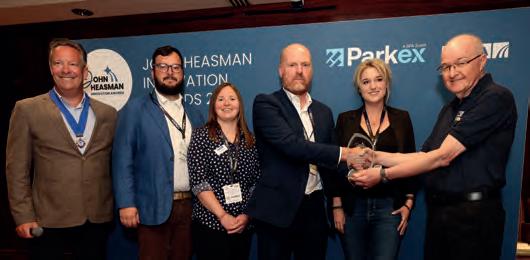
innovative use of real-time data and ANPR tech to drive urban parking compliance. Piloted in Oxford, the solution delivered a 34% increase in PCNs issued and a 700% increase in VRM scans, while also contributing to lower emissions through the use of electric mopeds. The judges praised KERBSight for its scalability and sustainability.
Dean Fennell-Connell, head of UK sales at Trellint said: “Winning the inaugural Parking Technology Innovation Award is a tremendous honour. This award recognises our team’s dedication to pushing boundaries, turning realtime enforcement data into smarter, greener, more efficient parking management.”
2. The Zero Emissions Innovation Award – Shortlisted finalists:
∞ Pair Parking
∞ Cambridge City Council
∞ Parkingeye – category winner! What the judges said: Parkingeye was recognised for its Evology Access & Charging solution. The industry-first innovation uses ANPR directly within the charging unit, allowing it to monitor the parking space it is attached to. This eliminates abuse, protects the car park’s investment in its EV infrastructure and provides fast, reliable charging to motorists in the car park. And with Tap & Go payments and live monitoring usability, it’s all about convenience, sustainability, and smarter mobility.
Chris Worthington, content executive at Parkingeye, said: “For electric vehicles and sustainable travel to be successful, there needs to be support and infrastructure that’s reliable, available, and protected – these are crucial aspects to making sure people can confidently switch to EV. Winning an award for being able to protect those services shows how much they matter and that our work to protect crucial parking is recognised.”
3. Parking Structures Innovation Award: Stripe Consulting: Blackpool Tower – category winner! What the judges said: Stripe Consulting impressed with its sensitive yet modern approach to the multi-storey car park near the iconic Blackpool Tower. The 1,306-space facility includes advanced traffic flow and accessibility features and was built using modular construction methods that support future mobility integration. The project was commended for blending technical excellence with respect for a historic setting. Russell Simmons, founder and shareholder at Stripe Consulting, said: “I’m delighted our work on the design of Blackpool Central MSCP has been awarded the John Heasman Parking Structures Innovation Award. Events of this nature allow the good work going on in our sector to be showcased, and the professionals who contributed to the projects to get the credit they deserve.”













Bay blocking is frustrating, causes congestion and can even be dangerous. In this article, we reveal the different types and look at ways it can be prevented
What is bay blocking?
A bay block is when a car or vehicle is parked in a bay it has no permission to be in. This could mean incorrectly occupying a designated bay, such as a loading, electric vehicle (EV), emergency vehicle, residential or disabled bay. In some instances, a vehicle may have been legitimately parked initially, but has overstayed the agreed time, breaching the parking regulations.
What is the impact of bay blocking?
With the exception of disabled bays and
emergency bays, many motorists perceive bay blocking as a minor inconvenience, o en overlooking its broader implications. For example, a driver wrongly parked in a residential bay might not realise the impact and inconvenience they are causing to the people who live there, who may be forced to find parking further away or unable to park their vehicle altogether. And, although overstaying in a retail car park may not seem to be particularly inconsiderate on the surface, it limits the number of available spaces
for other customers, which can lead to a reduction in a shop’s revenue.
Loading bays are another area of concern. Drivers o en misuse these spaces by claiming they are ‘just nipping into the shop for a pint of milk’, without properly considering the consequences. “When the public misuse loading bays, it delays deliveries and causes congestion,” says Shamala Gadgil, a consultant working on behalf of Coventry City Council. “It can also result in vans and lorries pulling up in unsuitable places, where they can block

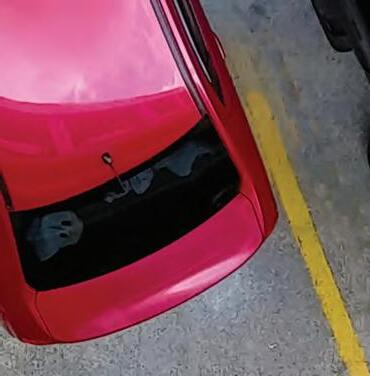
Le : Bay blocking can have a significant impact on other drivers, disabled motorists, local communities and businesses – as well as being dangerous
“The majority of Blue Badge bays, loading bays and EV bays are clearly signed and motorists who use them are doing so of their own choice,” says Peter. “With ‘Pay and Display’ bays, there is usually a ‘Maximum Stay’ and ‘No Return’ period clearly marked on the signs, so the motorist is given a clear indication of the terms and conditions when parking.”

actions create for genuine Blue Badge holders,” says Graham Footer, chief executive of Disabled Motoring UK (DMUK).

Shamala echoes this notion: “The signage at loading bays is generally very good so motorists don’t have the excuse of not noticing it,” she says.
Sara Sloman, chief strategy o icer at EV payments company Paythru, adds:

“Bay blocking is a significant issue that causes congestion and disruption for disabled motorists, local communities and businesses. More widespread enforcement and the power for those managing parking to issue higher penalties would go a long way in helping deter this behaviour. Clear signage and smart monitoring technology can also play an important role in preventing bay misuse. By fostering greater awareness and implementing effective enforcement measures, we can collectively reduce the frequency of bay blocking and improve the parking experience for everyone.”
visibility and tra ic flow. This can be very dangerous for other road users.”
Why do motorists block bays?
Drivers o en block bays due to a lack of awareness regarding the e ects of their actions on other road users. Many believe they can park without consequence, hoping to avoid a ticket. Some motorists argue that poor signage is the problem.
Peter Lowe, managing director of RTA Associates Ltd and chair of the BPA Wales Parking and Transport group, disagrees.
“Bay blocking –where petrol or diesel vehicles park in charging spaces (known as ICE-ing), or EVs overstay a er charging – adds to driver frustration and means lower returns for charge point operators (CPOs). There are several reasons why people might block EV charging bays. It might happen unknowingly, or motorists might do it out of desperation if the car park is full. Others may intentionally block these spaces out of selfishness or to make an anti-EV point.”
Whilst the vast majority of motorists recognise that it’s wrong to park in a disabled bay, sadly, some still do it. “Motorists who park in designated disabled bays know that what they are doing is just plain wrong, but few think about the negative impact their selfish
How can we address the problem?
Shamala advocates for increased enforcement levels: “I feel that there should be more civil enforcement o icers patrolling to issue fixed-penalty notices, to deter this type of behaviour,” she says. This could potentially be combined with higher fines, but unfortunately that’s not always successful. “Some motorists don’t see the fines as a deterrent, especially in local authority car parks where a Penalty Charge Notice (PCN) can result in a fine of between £50 and £70, reduced by 50% if the fine is paid within 14 days. That will bring it down to £25-£35, which some might see as a ordable,” says Jonathan Allen, head of learning, innovation and research at the BPA. “Another option to deter bay blocking could be to increase parking charges.”
Identifying and dissuading persistent o enders is another critical step. These aren’t people who have made a one-o mistake or decision to park in contravention of the rules, but drivers who repeatedly ‘take the risk’. Some hope they won’t be ticketed and fined, but pay up if they are. Others might never make payment, or are di icult to track down. In the latter instances, this might be because the vehicle is cloned, stolen or has foreign number plates.
Graham believes that higher penalties for parking in a disabled bay will help
stop drivers abusing disabled bays. “The current level of deterrent is obviously not working, so it needs to be raised. Perhaps we should look at the USA, which doesn’t have the same level of disabled bay abuse that we do,” says Graham. “Why? Because the level of deterrent is much, much higher.”
In the USA, the penalties for blocking a disabled bay vary by state and county, but range from hundreds of dollars to thousands for repeat offenders.
DMUK has taken significant steps over the years to address the issue through its Baywatch campaign – My Blue Badge Matters, which is relaunching on 21 July 2025. The campaign aims to highlight the persistent issue of disabled parking bay abuse in supermarket car parks. They request that anyone with a disability or who travels with someone with a disability by car completes a fiveminute survey about their experience of visiting a supermarket and using the car park. It enquires which disabled bays or Blue Badges are being misused, how many bays are available, and how often they encounter misuse of disabled bays during their visit to the following six
“For many disabled motorists, if the bay they need is blocked they will have no choice but to return home”
Graham Footer, chief executive of Disabled Motoring UK (DMUK)
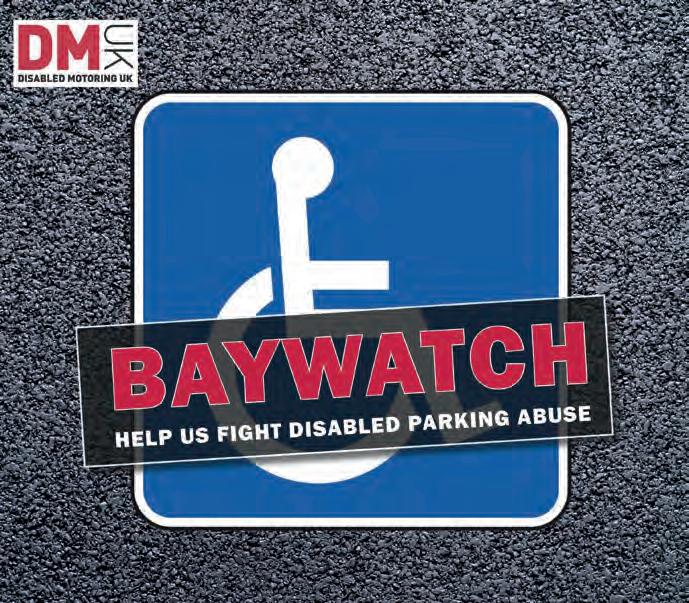
supermarkets: Tesco, Sainsbury’s, Asda, Morrisons, Aldi and Lidl.
The survey can be accessed at www. surveymonkey.com/r/BDWGZTT
Anyone who takes part will have a chance to win one of two £50 M&S gift cards.
DMUK would like to see all disabled motorists feel safe, confident, independent and respected when parking and traveling to their destination. This year, DMUK will be focusing on four key areas:
1. Challenging the ongoing abuse of accessible bays.
2. Examining public attitudes and misconceptions about Blue Badge use – especially those around nonvisible disabilities.
3. Publishing the lack of consistent enforcement undertaken by retailers and parking operators.
4. Gaining evidence of the general challenges faced by disabled motorists through the use of real-life parking experiences.
To combat EV bay blocking, Sara suggests leveraging smart monitoring
technology and payment solutions to enhance accessibility and enforcement. “Camera monitoring and ANPR can be linked to enforcement systems, automatically issuing alerts to enforcement officers whenever misuse is identified,” she says. “Smarter tariffing, such as overstay fees and dynamic pricing, can discourage overstays whilst compensating CPOs for lost revenue. Prebooking and app-linked charger activation can help prevent unauthorised use, though this should be used selectively, so as not to make charging burdensome,” Sara adds. “Another option is to put enforcement into the hands of the EV community, empowering drivers to report any bay misuse they encounter via the charging app or a digital charger interface.” By fostering greater awareness and implementing stricter enforcement, we as an industry can work together to reduce the frequency of bay blocking and its associated challenges.
Useful resources
For more information about DMUK’s Baywatch campaign, visit www.disabledmotoring.org/baywatch/aboutbaywatch
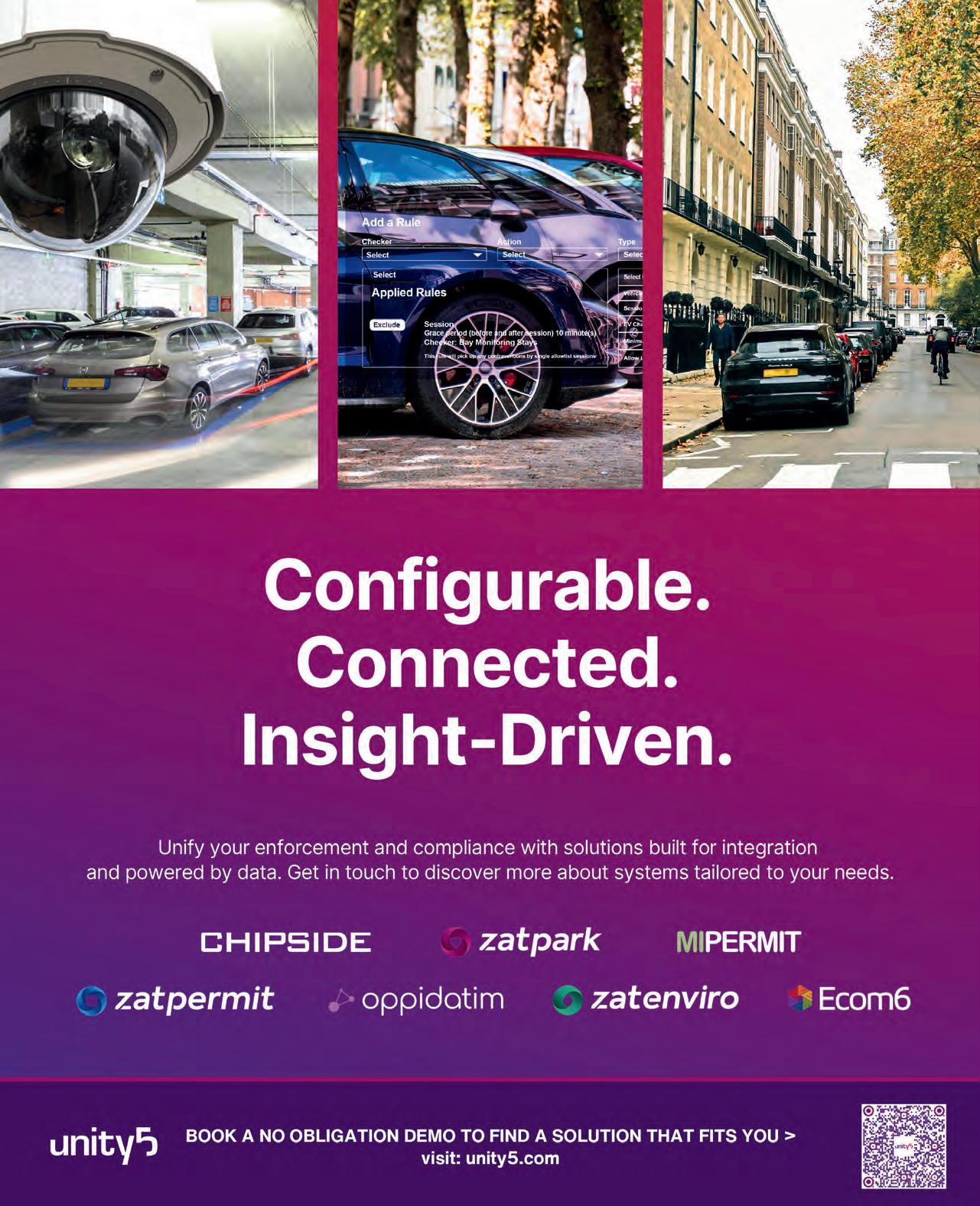
Learn how the BPA is supporting its members to stay ahead through its professional development programmes and pathways
In today’s fast-moving business world, employee training isn’t just important – it’s essential. For those organisations in the parking industry that are aiming to stay ahead, investing in people development is a smart strategy.
The British Parking Association (BPA) shares this vision. It champions professional development and accessible online training as key tools for attracting top talent and raising industry standards. In 2023, the BPA launched its professional development scheme, BPA Advance, followed by a 2024 partnership with City & Guilds to introduce the Assured Learning Programmes.
Want to know more about how these initiatives can benefit you and your team? Read on to explore the available schemes, their advantages and how you can get involved.
CITY & GUILDS ASSURED LEARNING PROGRAMMES
■ What is City & Guilds Assured?
City & Guilds Assured is a global stamp of quality, recognising top-tier training and learning. It shows that
an organisation delivers programmes that meet world-class standards.
In 2024, the BPA earned this prestigious recognition, allowing it to offer expert-led training in parking enforcement and notice processing.

These programmes are delivered by trusted Learning Delivery Partners – independent providers who work under the BPA’s quality framework. While the BPA ensures the high standards are met, the partners bring the training to life.
■ What do the Learning Delivery Partners deliver under the BPA Assured status?
Under the BPA Assured status, Learning Delivery Partners are approved to deliver certified training programmes that meet the standards set by the BPA. These programmes are designed to support professional development in the parking sector.
■ Currently offered programmes:
∞ Access Level Assured Certificate in Parking Enforcement
∞ Intermediate Level Assured
Certificate in Parking Enforcement
■ Programme pathways: Each credential offers tailored pathways to address the specific needs of different operational environments within the sector. These pathways include:
∞ Public Land (England, Wales and Scotland)
∞ Private Land (England, Wales and Scotland) This structure ensures learners receive relevant training aligned with the legal and operational frameworks of their working environment.
■ Are there new assured programmes on the horizon?
Yes. The learning and development team is working closely with the Blue Badge Taskforce to create a brandnew assured Blue Badge Enforcement Programme. It’s also exploring a tailored programme for team leaders and supervisors in the parking sector.
■ Is the BPA looking for more Learning Delivery Partners to deliver training? The BPA has six approved Learning

Delivery Partners, recognised for their adherence to global quality standards in training, that run the City & Guilds Assured Learning Programmes. Visit britishparking.co.uk/LearningDelivery-Partner-Directory for a list of the Learning Delivery Partners offering the right programme for you and/or your team.
If your organisation is interested in becoming a Learning Delivery Partner, fill out an expression of interest form here: https://forms. monday.com/forms/a47cfec8294 dca90e191651e161d318c?r=use1 or scan the QR code (right).
BPA ADVANCE
■ What is BPA Advance?
BPA VIEW
“Standardised learning ensures every learner receives consistent, highquality training, but also equips participants with the skills and confidence to excel in their roles.
“Excellence in training isn’t just about compliance, it’s key to our shared success. By upholding these standards, we safeguard the value of our credentials, the strength of our partnerships and the future of BPA City & Guilds Assured.”
Annie Cameron, BPA’s quality assurance manager
Julie Hicks, training manager for Midlands/North at APCOA Parking, discusses the importance of providing proper training
“At APCOA, we’ve always ensured that our civil enforcement officers (CEOs) start with accredited induction training. It’s essential they begin with the right knowledge to carry out their roles professionally and safely.
Quality training builds skills, boosts confidence, and shows employees they’re valued. It opens doors for development and promotion and creates a supportive work environment.
Consistent, high-standard training, especially in conflict management, is vital in such a high-risk role. It would be unfair to send officers out unprepared.”
Why Saba became a Learning Delivery Partner
H Cater, Saba’s HR and learning and development officer, reveals the benefits of City and Guilds Assured Learning Programmes
“Saba is committed to providing clients with an exceptional service. One of the ways we achieve this is to ensure our employees have the skills and knowledge to perform their roles competently. Being a Learning Delivery Partner gives us the tools to certify our enforcement teams to an industry standard.
They also allow personal and professional development; which Saba believes every employee has the right to achieve. All learners who pass the accreditation receive a City & Guilds Assured certificate, which can be motivational and add value to a CV.”
Whether you’re just stepping into the world of parking, or you’re a seasoned professional, BPA Advance is your go-to online professional development scheme.
Learn at your own pace, around your work schedule, all with the support of a dedicated team of passionate learning professionals who are with you every step of the way. You’ll have access to the BPA Knowledge Hub, expert career progression advice, regular webinars and e-zines, a dedicated Wellbeing Hub and opportunities to connect through exclusive networking events – all designed to support your development every step of the way.
■ Why join BPA Advance?
Because your career deserves more than just ticking boxes! With over 800 online training and CPD modules, BPA Advance allows you to grow, remain compliant and stay ahead, with everything you need in one central place. From essential courses such as
Sexual Harassment Training 2024, to exclusive content including Parking on Private Land (for AOS Members), there’s something for everyone. And with mobile-friendly access to the materials, you and your team can do your learning anytime, anywhere and at your own pace.
■ How do you sign up?
Getting started with BPA Advance is simple and surprisingly affordable. Prices start at just £70 per person, per year. For larger organisations, it’s even better value. Companies that sign up 250 or more members to the scheme will benefit from a reduced rate of £62.50 per person, per year.
For more information, visit britishparking.co.uk/bpa-advance or scan the QR code (shown on p19). Alternatively, email the learning and development team at traininganddevelopment@ britishparking.co.uk
“BPA Advance makes professional development flexible and accessible, whether you’re commuting, on a break, or working remotely. At just £70 per person per year, it’s a smart, cost-effective way to invest in your team, especially for smaller organisations. Plus, with regular updates and new content via the BPA Knowledge Hub, you’ll always stay current.”
Paula Burton, BPA training manager
and Development

Pavement parking is unsafe and unfair. So why isn’t it banned nationwide? Parking News investigates…
Since 1974, pavement parking – with certain exemptions – has been prohibited in Greater London. In December 2023, the Scottish Government passed legislation prohibiting parking on pavements in a bid to make them safer and more accessible. Meanwhile, England and Wales remain in limbo. The Labour Government has committed to addressing the growing issue of pavement parking nationwide, with MP Lilian Greenwood promising to respond to public consultations regarding a ban that was delayed by the previous government in 2020. But how would such a ban be implemented, and what lessons can be drawn from Scotland’s early experience? Four industry experts share their views.
Early reflections on Scotland’s ban
Stewart Skene: When the pavement parking ban came into force in Scotland, we expected a strong backlash – but there hasn’t been one. In fact, there’s been very few appeals and we’re seeing an 80% recovery rate on all Penalty Charge Notices (PCNs) issued for pavement parking. Most drivers accept they were in the wrong and just pay the fine, which isn’t always the case with other PCNs. That said, not every area in Scotland is enforcing the ban yet. The legislation
applies nationally to any footpath with public right of way – whether public or private. However, we’ve encountered complications in rural areas with narrow or unbound footways, where marking or enforcing restrictions is near impossible. There is also confusion around areas with grass verges separating the carriageway and the pavement. Technically, these are enforceable too, but are they really causing obstruction?
We hoped for more clarity from Transport Scotland, but it’s largely been le to local authorities to interpret.
Peter Lowe: Stewart, how are you managing residential streets with terraced homes and no driveways?
SS: Some councils, like those in the Scottish borders, have chosen not to enforce the ban because there’s simply nowhere else for people to park. In many terraced areas, we’re still catching up on mitigation measures. When the ban was introduced, there wasn’t time to put everything in place. In some cases, enforcement has been relaxed temporarily while solutions are developed – such as restricting just one side of a narrow road.
Cul-de-sacs are a tricky area for us. If we enforce the ban there, it can displace cars onto main roads, which aren’t restricted yet. But marking bays in these cul-de-sacs would drastically reduce the number of parking spaces available.




Helen Dolphin, founder of Dolphin Diversity. Helen advises government, public, commercial and professional bodies on accessibility.




Stewart Skene, community support and enforcement team leader at Perth & Kinross Council. Stewart has over 16 years’ experience in the parking industry and is BPA Chair of Parking Scotland.




Richard Walker, head of parking at the North Essex Parking Partnership and chair of the BPA’s board of directors. Richard has worked for over 30 years in the local authority arena.

Peter Lowe, chair of the BPA Parking and Transport Wales Country Group and managing director of RTA Associates. A past president of the BPA, Peter has 42 years’ experience in the parking industry.
Richard Walker: Stewart, you have an exemption for loading, don’t you?
SS: Yes, we do but the list is long and most exemptions are difficult to enforce. If there is enough space on the road, loading vehicles are expected to park on the road, not on the pavement.
PL: In Wales, we were exploring a similar ban before COVID-19 stalled the process. There was a lot of debate especially around what “counted” as obstruction. One suggestion was that two people should be able to pass as a metric, which isn’t a useable measurement or enforceable at all!
Then we had issues over overhanging garden hedges. If a car is parked on a pavement, but the hedge is also overhanging, who is at fault? The driver or the property owner?
PL: I keep pushing for complaint-driven bans. A focus on areas where people are actually being affected. In some areas, considerate drivers already manage well without a ban. Imposing one will just displace the problem elsewhere by moving cars onto main roads where we don’t want them parked either. We’ve been waiting to see what England will do about it. There are so many nuances involved in a national ban. Does Scotland have a timescale for when all councils have to enforce the ban?
SS: There’s an expectation from Transport Scotland that everybody will, however it’s been left up to local authorities to decide when.
RW: In England, outside London, we’ve been waiting quite some time for a decision. I remember being in a meeting back in 2018 where the DfT asked us if we wanted an outright ban, or whether we wanted to be able to make a decision within our local authority? Most replied that they wanted to let

ban, only for local councils to then fill up the pathways with EV charging points.
“We’re seeing an 80% recovery rate on all Penalty Charge Notices (PCNs) issued for pavement parking”
Stewart Skene
local authorities decide. In Essex, we’ve prepared draft policies for a potential ban that required a 4ft clearance on footpaths. But there is always the concern as to where all those displaced cars will go.
PL: Helen, when we were at the Welsh conference last year, we raised the issue of implementing a pavement parking
HD: I don’t think that they should be on the pavement either, quite frankly. It’s just another pavement infringement. I don’t need something else blocking my way. There are better designs coming through now where the charging station can fold away completely. I think, as an industry, we need to be looking at better solutions, rather than just going for the cheapest, bulkiest technology.
SS: I completely agree with you, Helen. We don’t have petrol stations in housing estates, so why should we be fuelling people’s cars with electricity?
HD: I don’t see the point of them. Drivers aren’t benefiting from the cheap electricity that they get from a home charger. So why not charge at a nice speedy hub somewhere? Let’s start making use of discarded petrol stations, of which there seem to be quite a lot, by turning them into EV hubs.
RW: Now is the time to lobby this Helen. In Essex, we’ve got another
5,000 EV chargers coming. Suffolk has another 6,000 EV chargers coming as well. HD: I just don’t think many people will be charging on the street. They’ll either be charging their vehicles at home if possible, or they’ll be charging them when they’re out and about, such as at the railway station, in a car park, at the shopping centre or in a motorway service station. I rarely see people charging on the street. It doesn’t make sense to me when you’re paying an electricity price that’s potentially four times the cost of charging at home.
At the end of the day, we need to remember that pavements are for people and not intended for cars. If someone parks on the pavement and there’s no drop kerb, as a wheelchair user I am stuck. Or I have to go significantly out of my way to cross a road before I can then return to the safety of the pavement. That’s one of the biggest issues and I think that’s why a pavement parking ban can’t be complaint led. The pathways need to be safe all the time.
And I’m not just talking about quiet roads in small housing estates. Sometimes it can be a road where
cars are driving at 50 or 60mph where wheelchair users, scooter users, parents with a buggy or someone with a guide dog are being forced onto the road. I’m not trying to inconvenience drivers. It’s about safety.
We need to re-educate the public. I think I’ve been in so many conversations to know that it’s going to be near impossible to implement a blanket ban nationwide. I’m not that naive to think that that would work, but I do think we need to perhaps do more than we’re currently doing. I think the public deserve an answer to the 2020 consultation. Motorists and pedestrians need to know what is happening and what the government is going to do to make our pavements safer.
I think it’s a combination of a ban and re-education. A disincentive, such as a PCN, is probably the only way to tackle the problem.
I’m really interested to see how it pans out in Scotland. What worries me is if drivers start using the same argument, ‘I’m only going to be five minutes’, that they do for Blue Badge abuse.
SS: We started with a three-month warning period before enforcement.

“A disincentive, such as a PCN, is probably the only way to tackle the problem”
Helen Dolphin
Once the ban kicked in, we had CEOs patrolling until 10pm each night. Drivers became compliant relatively quickly. And in the areas where we issued PCNs, those places are now mostly compliant.
RW: The roads will need to be patrolled more at first, but I suspect it will calm down. I think one issue that we will have is where people believe they own the piece of land in front of their home and therefore have a right to park there.
SS: That’s one of the most frequent complaints that we get. Even though the new legislation applies to both private roads with public right of way, residents are often adamant that their title deeds give them parking rights.
HD: It’s like the disabled bay issue. You pay the council for one outside your home, but any Blue Badge holder can legally park in it.
RW: Do you think the increase in vehicle size has contributed to more pavement parking?
HD: I think it’s a habit. Even small cars are doing it.
SS: I do think drivers are parking on pavements to avoid their wing mirrors being clipped – but ironically that speeds traffic up, creating more risk. We get a lot

of calls for exemptions in these situations. Yet often there’s more than enough space on the carriageway.
RW: We really do need national consistency. Local authorities in England can currently put a traffic regulation order in place to prohibit parking on the footpath. But a separate order for every street they want to restrict has to be applied for, complete with signs. It’s timeconsuming and expensive. A national ban would treat all motorists fairly.
PL: But it needs to be informed. Stewart, did Transport Scotland consult councils before drafting legislation?
SS: No, the legislation felt rushed and open to interpretation. It would have helped to have involved parking managers from the outset.
RW: I think a standard national decision where all motorists everywhere are treated in a fair and consistent manner is needed. But I must emphasise the need for lobbying. Especially with the change in political landscape with Reform gaining traction. I don’t know what their policy is on pavement parking?
HD: I think they’d be against it as they’re very pro-motorist.
RW: I think this conversation is starting to be driven by what MP Lilian Greenwood said at Parkex 2025, where she mentioned the lack of response to the consultation
in 2020. I’m interested to hear what the government is going to say about it. But we’re probably still a long way away from the government taking action. Now’s the time to lobby!
HD: Ultimately, pavements have become unsafe, because of parking, e-scooters, bins and more. We’re not trying to punish drivers, but the public deserves to know what’s being done to make pavements safer. A disincentive such as a PCN is probably the only way to tackle the problem.
I don’t think most drivers set out to deliberately make someone’s day harder, but many don’t realise the impact of parking on a pavement until they’re confronted by someone like me.
SS: If I could go back, I’d have involved the emergency services earlier before we implemented the pavement parking ban in Perth and Kinross. Displaced cars ended up creating issues for fire engines and ambulances in some areas where they didn’t have space to drive down streets. Thankfully, we addressed the situation quickly. I’d also recommend councils liaise with public transport operators to ensure bus access isn’t compromised.
Have you got a hot debate topic? Email your Roundtable conversation ideas to editor@britishparking.co.uk. Parking News needs industry voices to shape the conversation!
“Whilst a nationwide pavement parking ban is a necessity, there is an abundance of public roads that are too narrow to permit parking on the carriageway, and properties adjacent have been permitted to be built without contained parking facilities. It’s a difficult discussion with those residents, but a needed one.”
Bruno Barbosa, parking services operational manager at Spelthorne Borough Council
“Pavement parking has long been a problem across England due to outdated infrastructure. For many disabled people, clear and accessible pathways are essential for independence. We’d like to see a ban on pavement parking but with exemptions made by local authorities where it cannot be avoided and greater care in future infrastructure builds. Priority on all pavements should always be given to pedestrians and accessibility requirements of people with disabilities.”
Zoe Rush, marketing and campaigns manager at DMUK
BPA VIEW
“We need clarity. At some point the Government is going to have to decide whether it is going to implement a pavement parking ban in England, outside of London. As Scotland and London show, it can work and it doesn’t have to be controversial. However, it does mean learning from those examples and ensuring any new policy is deployed in a practical manner working with local authorities.” Isaac Occhipinti, BPA head of external affairs
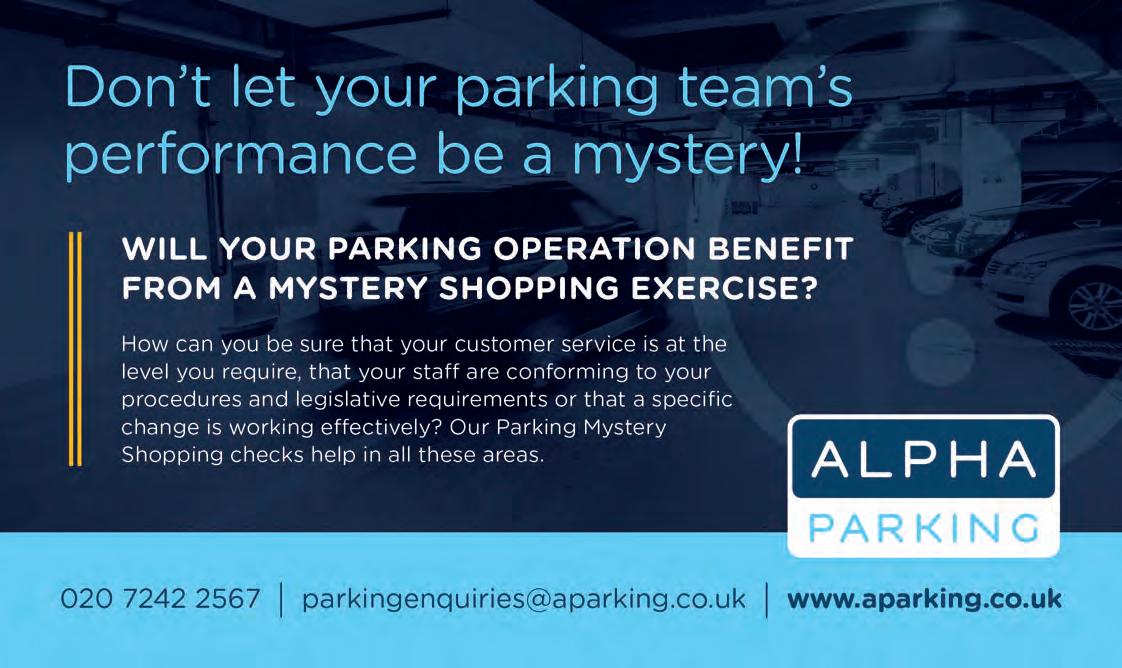
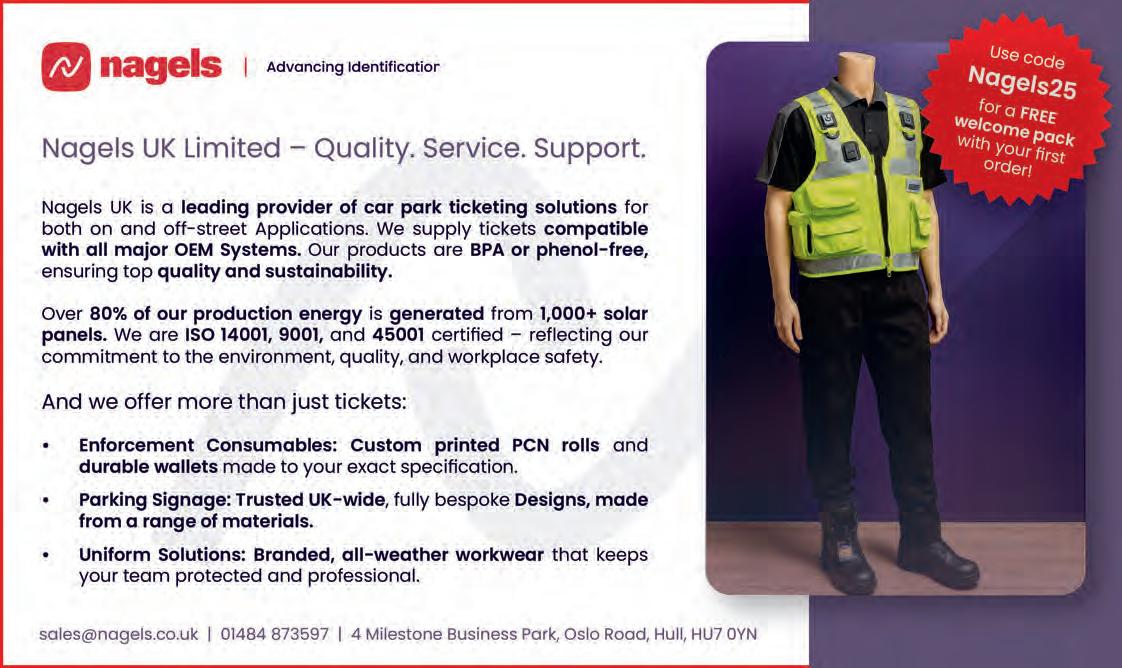
Consultation on the Private Parking Code of Practice isn’t far away. Be ready when the call for industry input comes
Following a hugely successful Parkex 2025, where fellow parking colleagues gathered to discuss the progress of the Private Parking Code of Practice, it’s clear that the next phase of collaboration and evidence gathering is critical. As we near the one-year anniversary of the joint BPA and IPC Single Code of Practice, attention now turns to the upcoming Government Code of Practice. Stakeholders can act now by preparing a robust evidence base to support consultation responses when the call for input opens. This preparation will be key in shaping fair, e ective and enforceable policy.
1. Engaging clients and landowners
In addition to encouraging landowners to prepare and submit their own consultation responses demonstrating, at the very least, the positive impact of e ective car park management and the benefits this brings to compliant motorists, parking operators and debt resolution agents can collate customer and client testimonials to demonstrate how the parking enforcement has benefited their land, facilities and businesses. Feedback from landowners should highlight the positive outcomes of reduced anti-social behaviour, increased footfall and any other positive impacts that can be seen once private parking enforcement has been implemented. Whilst testimonials may be viewed as qualitative evidence, they can be used to support the quantitative evidence.
2. Collecting an evidence base
Alongside the BPA’s continued work, including survey data collected via the Census, operators are in a unique position to compile evidence from their own estates. This should include:
∞ The most common types of contraventions.
∞ The increase in the number of car parks and parking spaces.
∞ The contravention rates per visitor.
∞ Before-and-a er evidence (eg week 1 vs week 52 of management). Before-and-a er evidence can help illustrate the necessity of enforcement, particularly in challenging environments like retail and hospital sites. Operators should also gather evidence from DRAs showing:
∞ The extent of vulnerability checks.
∞ Mitigation e orts that prevent escalation to court.
∞ The role DRAs play in encouraging constructive resolution.
Another key theme will be appeals transparency. The media narrative around private parking o en focuses on perceived unfairness in the process. Now is the time for the sector to respond. Operators can help by providing:
• First-stage appeal volumes and outcomes.
• Second-stage appeals process escalation rates and reasons.
• Evidence of how the appeals charter is being applied – particularly in technical breach cases or genuine mistakes such as mis-keying or providing evidence of




Derek Millard-Smith
BPA Lawline partner, JMW Solicitors LLP bpa@jmw.co.uk
payment of a parking tari . Key themes to consider are:
• The need for e ective deterrent.
• The financial, practical and time losses to the facilities the parking areas service where enforcement is ine ective.
• The impact on maintaining legitimate tari revenue of abuse of parking areas undermining, too, the experience and accessibility for compliant motorists and their sense of fairness in the system.
• The parallel need to continually raise standards, ensure fairness with regard to genuine mistakes and build trust in enforcement processes.
This is a pivotal moment for the private parking sector. The more evidence we can prepare ahead of the Government’s formal consultation, the more influence we can have in shaping the final outcome. The sector has the opportunity to guide the government’s policy making based on factual evidence to ensure the future e ectiveness and fairness of private parking enforcement.
BPA Lawline: find out more
This information is for reference only, if you have any specific legal queries arising from the content of this article or generally you can contact Derek Millard-Smith and his team at JMW Solicitors through BPA Lawline via bpa@jmw.co.uk or call directly on 0345 241 3024. BPA members can receive up to 30 minutes free legal advice from BPA Lawline.





























































































Gatwick Airport’s new 3,250-space car park combines smart design, advanced security and future-ready infrastructure – earning it the Park Mark and Park Access awards
Gatwick Airport and National Car Parks (EUK) have recently achieved Park Mark and Park Access awards for the new mid-stay parking facility at the North Terminal. Built using Goldbeck’s pre-fabricated construction system, the accolades highlight the airport’s commitment to providing accessible and safe car parking for its customers.
Due to Gatwick’s long-term growth strategy and the possibility of a second runway, the airport recognised the need for practical and secure parking.
Goldbeck was commissioned to deliver a major expansion of the existing facility at the North Terminal resulting is a high-spec, multi-storey car park o ering more than 3,000 new spaces.
Accessible and safe design
Security was a key priority. Almost two thirds of the facade faces the airport’s airside boundary, requiring strict adherence to ASIAD (Aviation Security in Airport Development) guidelines.
“The design incorporated reinforced crash mesh, doubled up along key sections of the perimeter, as well as bu er zones in areas identified as having a higher risk of progressive structural collapse,” says Samuel Jupe, site manager for the Gatwick project.
To meet the required 60-minute fire resistance rating, Goldbeck’s steel and precast concrete system was used. The company also worked with FEM (finite element method) modelling specialists. “Together, we conducted advanced thermal simulations under multiple real fire scenarios. These

BPA VIEW
‘Infrastructure projects at airports have a higher level of complexity. Goldbeck’s example at Gatwick is exemplary. I am delighted that it has achieved our prestigious awards which demonstrate Gatwick airport’s commitment to crime prevention, safety and accessibility.’
Sara Fisher, BPA head of operations and business development
models were integrated into structural calculations and used to optimise the design, reinforcing the structure where necessary,” says Samuel.
Accessible bays on the ground floor are connected to the terminal via three li cores, ensuring step-free access.
Sustainable solutions
Sustainability shaped every phase of the project. The prefab construction enabled rapid assembly with minimal on-site waste and its key structural components, such as precast ceiling
Number of levels: 7
Total car park bays: 3,250
Accessible bays: 68 Project completed: June 2024
slabs and steel columns, are supported by Environmental Product Declarations (EPDs), verifying their environmental impact. Notably, the steel frame uses Electric Arc Furnace (EAF) technology, cutting emissions by over 50% compared to the UK average.
Although EV chargers are not yet installed, future needs have been anticipated. “This ensures that the site is fully equipped to support the future installation of EV chargers, including accessible units designed to serve drivers with disabilities,” says Samuel. “In the meantime, a dedicated fast-charging hub has already been established at the South Terminal.”
TO FIND OUT MORE about Park
Mark and Park Access awards visit britishparking.co.uk/park-mark and britishparking.co.uk/park-access
If you’ve been part of a new development, renovation or a simple but transformational new idea, we’d like to hear about it. Share your stories with editor@britishparking.co.uk
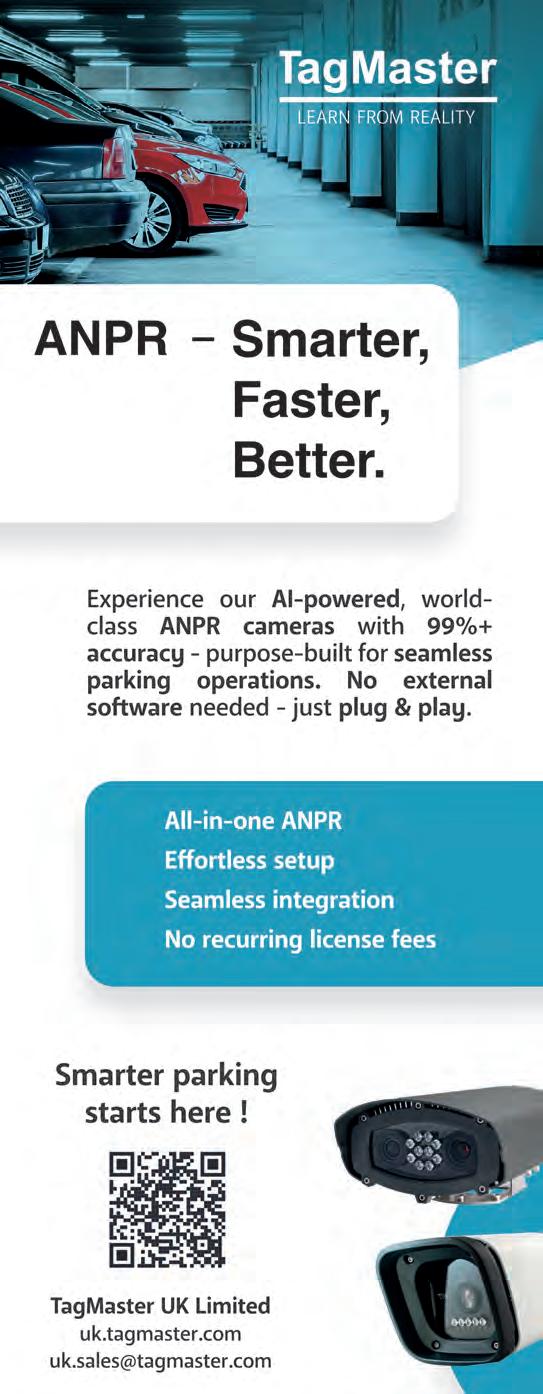



Parking News talks to Sarah Randall , the new interim chief executive of the National Parking Platform
Sarah Randall’s journey into the parking industry is both unique and inspiring. Starting her career as an executive trainee in retail, she honed her skills in management and leadership in various sectors, from food and drinks, to jewellery and homewares. The turning point came in 2008 when she applied for the role of general manager of operations and infrastructure in Croydon Council’s parking team, and she has been dedicated to parking ever since. Sarah has been a driving force in initiatives such as Healthy School Streets, has received numerous awards for innovation in parking, and has fostered a culture of collaboration and communication within her teams. Read on to learn more about Sarah’s career journey.
Why did you apply for a role in parking? I thought to myself, I can manage a large team, I can manage a budget, and I drive a car – how hard can parking be? I’ve been in parking ever since and I quickly discovered there is a lot more to it than simply driving a car!
When I joined Croydon Council, I looked after the customer service team responsible for handling representations and appeals in its enforcement team, before becoming its parking services manager. In 2016, I was promoted to head of parking, managing everything from parking policy and parking strategy to transport strategy.
Working in local government can be tough and extremely challenging, especially concerning budgets.
The many restrictions make it difficult to implement change
In 2021, I took on a new role at Newham Council as assistant director of traffic and parking, after Croydon Council went into administration. The role involved consolidating the enforcements team, customer service team and policy team into a single business function.
In 2023, you took on the role of director of local government and propositions at the Agena Group. What inspired your move to the private sector? Working in local government can be tough and extremely challenging, especially concerning budgets. There are many restrictions, making it difficult to implement real change. After discussing my aspirations in parking with Paul Dawson, the chief executive of Agena Group, he offered me the role of director of local government and propositions. It is an incredible employer and has

given me the freedom to explore various projects I’m passionate about!
Can you tell us about some of these projects?
I’m deeply passionate about the Women in Parking Group. It’s a great initiative that aims to support and uplift women in the industry. We address common
issues such as imposter syndrome and we provide a platform for women to be able to share their experiences. It’s about creating a community where women can connect, ask questions and support each other.
I’m also Chair of the Smarter Parking Group, Chair of the Technology, Innovation & Research Board, Chair of the London Regional Group and, because of all these roles, I am also now a Board Director for the BPA.
As well as that, I’m an ambassador for the National Persistent Evaders Database (NPED), a system that centralises data on vehicles that consistently evade parking fines, carry cloned number plates, or have no MOT or insurance. I absolutely believe in what CEO Alan Wood is trying to achieve. We need a joined-up approach with local authorities, the police and with other central government departments about our vehicle community. There are drivers who are inherently trying to do the right thing. But there are also drivers who aren’t – what I refer to as the naughty side of parking! And we need to be able to not only recover vehicles, but also foster lasting behavioural change.
You’ve recently been appointed the new interim chief executive officer of the new National Parking Platform (NPP). Can you tell us a bit more about your plans for the role?
On the positive side of parking is the NPP. I’ve been on the steering board and chair for some time. The NPP aims to unite councils, parking providers and lead tech companies to simplify the parking process for the average driver and it’s set to revolutionise parking.
The system will allow drivers to pay for parking in all participating car parks using their preferred app, whether that’s RingGo, JustPark, PayByPhone,

We need a joinedup approach with local authorities, the police and with other central government departments about our vehicle community
APCOA, AppyParking, MiPermit, Caura or others. Just as the banking revolution changed the way that we manage our finances where customers could withdraw cash from any bank, I believe the NPP can revolutionise how we think about parking.
What are the most pressing challenges faced by the parking industry?
The public perception of parking.
The number of vehicles on the road is increasing yet, for 95% of the time, a car is parked. Nobody wants to pay for parking in the same way that nobody wants to pay tax. But if you don’t, things don’t work in society. Offering free
parking – in a hospital for example – can lead to a lot of non-compliant vehicles because ‘free’ makes people think they can park wherever they want and that limits the drivers who don’t have any other mechanism for getting to that hospital. How we change that, I’m not sure, but initiatives like the NPP are part of the solution.
In a field still largely dominated by men, what would you say to other women in the industry considering a senior role in the parking sector?
Go for it. Taylor Swift, fake it until you make it! Seriously though, you learn more from the things you get wrong than the things you get right. Take advantage of the educational opportunities that are offered to you – something that the BPA is doing a lot to help and encourage! And join working groups to be part of the discussion around how to initiate change and to get involved.
Introduce your parking people If you have new faces, movers and shakers you would like to share, please email editor@britishparking.co.uk



lections have taken place in five groups, with the following members being successful:
• David Bagwell (EV Connect Representative)
• Lorna Day (Local Authorities Representative)
• Paul Kelly (Enforcement Agencies Representative)
• Manny Rasores (Parking Technology Representative – oneyear term)
• Karen Day (Midlands Regional Representative – two-year term)
Many incumbents stayed in post:
Regional Representatives: Zulfiqar
Ali (Eastern Region); Roy Tunstall (North West); Richard Boultbee (Yorkshire and Humber)
Local Authorities Representatives: Jason Passfield, Alexandra Hobbs
Parking Technology
Representatives: Hannah Fuller; Enforcement Agencies
Representatives: John Mason
Parking on Private Land Operators
Representatives: Gary Osner, Mark Anfield and Andrew Valentine
Congratulations to the successful candidates who, unless noted, began a three-year term from 1 July 2025.
The BPA would like to thank Scott Gow, who became the first Chair of the EV Connect interest group when it was formed in 2023. During his tenure, the group has gone from strength to strength, reflecting the growing rollout of EV infrastructure. Scott led by example and regularly represented the BPA, speaking at key industry events. He will continue to be a valued member of the group in his new role as Commercial Director at WPS. He is succeeded by David Bagwell, senior business development manager at Believ, as the newly elected chair.
Kelvin Reynolds, BPA Company Secretary, said: “Thank you to everyone who put themselves forward but were unsuccessful on this occasion, and to those who stood down or were unsuccessful in retaining their position. Your service as a BPA Council representative is greatly appreciated.”
The government has confirmed that the BPA will take forward the development and running of the National Parking Platform (NPP) with a consortium of industry leaders. The new agreement will see the parking sector working with councils to run the platform on a not-for-profit basis. So far, the platform has been rolled out in 10 local authorities and now handles over half a million transactions a month. Andrew Pester, BPA chief executive, said: “We’re thrilled with this outcome and excited to collaborate with the Department for Transport and the new NPP company to create a better parking experience for all drivers.”
Welcome to the BPA’s new members!
Tameside MBC
Parking Services, providing on and off-street enforcement including pay and display car parks and bus lane contraventions. tameside.gov.uk
UTS Technologies
Leaders of the Irish parking industry with innovative, robust and practical solutions. It provides terminals, data, payments, smart guidance for accessible parking, kerbside management and EV charging. utstechnologies.ie
North Northamptonshire Council
Local authority for North Northants. northnorthants.gov. uk
Entace Ltd
Parking management software and beta enforcement trading as Stadi, Parka and Matchdayparking.com. stadi.co.uk
ScanNeo Ltd
Delivers real-time, AIpowered enforcement and analytics tools
including mobile ANPR devices, CEO enforcement app, back office management system, real-time contravention alerts, live patrol tracking and route planning, parking stress heatmaps, air quality monitoring, custom analytics and reporting, and optional feature development. scanneo.co.uk
Civil Debt and Bailiff Services
Primarily debt resolution via written communication. Providers of connections to third party organisations to assist clients with issues encountered including solicitors, bailiffs and legal representation. civildebtservices.com
Platinum Valet (Birmingham) Ltd
Meet and greet parking valet service. platinumvalet.uk
Getmapping
Provider of geospatial data and solutions including highresolution aerial imagery, LiDAR, mobile mapping, and streaming services. getmapping.co.uk
he inaugural BPA Vice President’s golf day provided a great deal of enjoyment, camaraderie, and a healthy amount of competitiveness among the participants, along with some fabulous sunshine. Taking place at Coventry Hearsall Golf Club, the course proved perfect for this event, tight but challenging enough, and we couldn’t have received a warmer welcome from the hosts.

Eight teams took to the course, with ‘scramble’ being the chosen format of the VP – this proved to be an excellent choice, engendering some true teamwork amongst the mixed ability of the players. The overall winners of the team trophy were Team Simplyture – consisting of David Stone, Mike Elrin, Richard O’Malley, and Rob Perry. The trophy for the longest drive went to Kesley March, and Gary Osner and Jon Caudell took the trophies for nearest the pin on the front and back nine. The day also raised a donation of £320 for the BPA’s newly appointed corporate charity, MND Association. Everyone had such a good time that it was unanimously agreed upon a return to Hearsall next year to settle some scores. The BPA is pleased to announce that the 2026 Parkex golf day will take place on 19 May. Early enquiries or expressions of interest can be sent to events@britishparking.co.uk.
On Friday 30 May, the BPA, local authorities, enforcement agencies, and members of the public came together to support the correct use of the Blue Badge scheme, helping to protect access for those who truly need it. The misuse of Blue Badges by dishonest drivers prevents people with disabilities from being able to park where they need to. Fraudulent usage undermines faith in the scheme and damages the reputation of the Blue Badge system. This is why the day of action was so important, and early statistics already show it to have been a great success, with participating councils spanning the country.
Alison Tooze, chief engagement and policy officer at the BPA, said: “The statistics around the level of Blue Badge misuse and fraud are shocking. We cannot continue to ignore this issue, especially when the victims are some of the most vulnerable in our society.”
• 16 July - Southern Parking Pod, Basingstoke. Sponsored by RingGo. Book here: britishparking.co.uk/ Events/southern-parkingpod/16008?OccId=21904
• 17 July - BPA Political Update Meeting (Teams): britishparking. co.uk/Events/bpa-political-updatemeeting/15997?OccId=21893
• 18 September AOS Live, Canary Wharf, London.
Interested in all things private parking? Then you need to attend AOS Live to enhance your reputation, master enforcement communication, explore the latest in parking technology, and get the latest updates on the Code of Practice Act. Book here: britishparking.co.uk/Events/aos-live2025/15983?OccId=21879
Park Mark: Flying Scot in Edinburgh, an airport parking provider, has earned a Park Mark award, as did Cambridge University for its park-andcycle site, which provides safe parking while promoting active travel.
Park Access: Q-Park’s Metropolitan University Hospital in Birmingham has earned both Park Mark Plus and Park Access awards, as did NCP and Gatwick Airport’s car park in the North Terminal and Churchill Services’ car park at St Stephen’s Shopping Centre in Hull. Rushden Lakes retail park in Northampton has also earnt Park Access and Park Mark awards.
Park Mark Freight: Malcolm Logistics has earned five more Park Mark Freight awards. This latest set of awards is in recognition of five depots in Grangemouth, Paisley, and Penrith, which were assessed and met the highest standards for safety and driver welfare.

Helping cities decarbonise, from the kerb up. Faster, more accurate digital tra ic order management. Automated, centralised tari management. Driver-centric parking payments and connected car services. Real-time bay occupancy and insights. EV charge point integrations and data-led rollout. sales@appyway.com | appyway.com
Cammax o er innovative payment systems to today’s ever changing parking market. Providing our partners with tailored pay on foot, pay & display and hybrid parking payment systems. With our intuitive customer-facing applications and data rich back end systems, Cammax o er flexible solutions along with outstanding customer service. 01977 669946 | info@cammaxlimited.co.uk | www.cammaxlimited.co.uk

CSL has been providing secure connectivity for critical IoT applications for over 25 years. Their fully managed, end-to-end connectivity innovations utilise technologies such as 4G and are secure, reliable and hassle-free, whilst their expert support teams are here for you 24/7.
+44 (0) 7909 991 090 | hiran.ravat@csl-group.com
DESIGNA design, manufacture and install fully automatic “Pay-on-foot” car parking systems. DESIGNA provides the answer to your parking needs with more than 16,000 installations worldwide; from simple standalone systems, to large, citywide networks, entire airport complexes, hotels, shopping centres and hospital estates. 01932 784040 | sales@designauk.com | www.designa.com


The UK’s largest parking enforcement debt resolution provider. Letter cycle recovery service with a 25% higher collection rate than our competitors. 0203 434 6132 | enquiries@dcbltd.com
Entry Parking Posts is a well established UK company, founded over 30 years ago, specialising in tra ic control equipment, spike barriers, and the original manufacturer of ALLIGATOR TEETH. Our tra ic direction restrictors are superior in design and performance to tra ic flow plates. Our equipment solves any problems you may have controlling access, tra ic and maintaining the security of your site. 01564 773188 | www.entryparkingposts.com

Floor + Wall operates throughout the U.K. O ering a range of services from specialist waterproofing coatings for parking structures, industrial screeds and specialist resin flooring, structural waterproofing and concrete repairs.
As an award winning family built company we are continuously looking to challenge and develop the way the industry engages contractors.
Floor and Wall Ltd, Kelfield House, Berkeley Business Centre, Doncaster Road, Scunthorpe DN15 7DQ | +44 (0) 1724 281 500 | www.floorandwallltd.com



G24 specialises in providing car park management solutions specifically tailored to suit retailers, retail parks and other corporate and independent organisations throughout the UK. Caroline Sargeant | 0370 0427 215 | caroline.sargeant@g24.co.uk | www.g24.co.uk
HUB Parking Technology develops, manufactures, installs, and provides a er-sales support for HUB Parking Access and Revenue Control Systems. The company creates state-of-the-art systems that make parking e icient, profitable and easy to manage. Sarah Cosby | sarah.cosby@faac.co.uk



Leading experts in car parking refurbishment with over 40 years of contracting experience. O ering life care planning, testing and investigation with full turnkey solutions to the parking industry to refurbish, maintain and enhance your parking facility.
08458 994444 | enquiries@makers.biz | www.makers.biz
NMI develops trusted payment so ware for mobile, online, and in-store payments. You’ve probably used it without realising it when booking a ticket, paying for parking, or making a charity donation. Its Payment Gateway is used by developers worldwide to add payments to their solutions enabling them to focus on what they do best. 0117 930 4455 | hello@nmi.com | www.nmi.com
NSGL Parking believe that parking should be simple and stress free. A er all it is the most insignificant part of any journey but usually the part that is the most emotive. 03333 201 858 | admin@nsglparking.co.uk | www.nsglparking.co.uk
Parking Associates o ers an independent perspective and insight, providing unbiased innovative ideas to increase all-round e iciency. The services are available for short or long-term projects.
Kirsty Reeves | 07917353218 | info@parkingassociates.co.uk www.parkingassociates.co.uk


As the ANPR market-leader, Parkingeye’s mission is to make life easier for businesses and their customers by giving them the capabilities to park e ortlessly in a highly connected world. Managing thousands of sites with a 98% client retention rate, our team deliver results which help our customers thrive.
Parkingeye Ltd | 01772 450 542 | marketing@parkingeye.co.uk | www.parkingeye.co.uk


An extensive, fully configurable PCN Suite, including web and mobile Attendant, Front of House Kiosk, DVLA Scanning applications. Automated Management Portal supporting Static & Mobile ANPR PCN issuing with IVR, Driver App & Pay By Text or Phone. Location Geo Fencing with Self Set Up. 0333 332 7930 | info@parksmartsolutions.co.uk
RTA OrderPro, is a cost-effective managed service offered by RTAA, as a DSP to the DfT hub, to host and update DTROs in real time to ensure business continuity. Also available is a conversion tool for HA’s to upload DTROs from their corporate GIS software to the DfT’s DTRO hub.
Peter Lowe | 07900 264137 | plowe@rtaassociates.co.uk | www.rtaassociates.co.uk



With a proven track record of excellence, we specialise in revitalising and optimising multi-storey car parks to meet the highest standards of functionality, safety, and aesthetics, including, concrete repair, expansion joints, deck and decorative coatings, line and bay demarcations, and maintenance programmes. 01270 439909 | info@structurecare.com | www.structurecare.com
Experts in parking systems, electric vehicle charging solutions, signage & safety systems, and traffic control & management. SWARCO solutions improve quality of life by making the travel experience safer, quicker, more convenient and environmentally sound. 01748 824624 | info.uk@swarco.com | www.swarco.com
TagMaster UK Limited is a leading manufacturer and supplier of traffic monitoring equipment, a wide range of instrumentation and software systems are available ranging from temporary deployable radar devices through to full real-time ITS systems.
4 Caxton Place, Caxton Way, Stevenage, Hertfordshire SG1 2UG 01438 347555 | sales.uk@tagmaster.com | | www.uk.tagmaster.com
The smart choice for any organisation in any parking and EV charging environment. Our contactless payment terminals and our mobile phone app, Twinpay, offer a seamless payment platform with dual functionality to pay for parking or EV charging. Supported by a unique back office system, the Twin range of products is fully OCPP compliant. 0114 3497070 | enquiries@twinpay.com | www.twinpay.com

Unity5 make the complex simple with market leading Zatpark parking enforcement, administration and management software, incorporating an ANPR-enabled street enforcement mobile app. Features provide complete control of the full life-cycle of parking enforcement data, from issue to recovery action and every step between. 03333 440515 | www.unity5.com

Kelvin Reynolds explores the nuanced differences in parking management at Parkex, where industry leaders united to tackle key challenges and drive innovation
I’ve recently been reminded of the game “Spot the di erence” where players find discrepancies between two seemingly identical images or situations. While this is o en a children’s game, there are grownup versions where the di erences are more complex or subtle.
In our industry, two accredited trade associations represent companies managing parking on private land. One is focused, while the other takes a broader approach. Though they may appear similar, they are distinctly di erent. Yet the press, politicians, and public o en struggle to spot the di erence.
It’s clear to those who attended Parkex 2025 at Coventry where you will have seen the sheer scale and scope of our sector. Parkex is the flagship conference and exhibition hosted by the British Parking Association (BPA); it unites BPA members and parking leaders across government and industry at the sector’s largest annual parking event. Bigger! Brighter! Better! This year, government minister Lilian Greenwood MP, Parliamentary Under-Secretary of State (Minister for Future of Roads) attended Parkex. She announced that, following successful collaboration with the sector, the government confirmed that the BPA –with a consortium of its members – will now take forward the development and running of the National Parking Platform (NPP). Brilliant!
During her visit to the BPA stand, she met representatives of the consortium of BPA members who will take this project forward. She also learned about other important initiatives we are focused on: tackling Blue Badge misuse, abuse, and fraud; removing non-compliant vehicles from Britain’s roads, those which are uninsured, untaxed, unregistered, and sometimes unidentifiable, o en with multiple outstanding penalty charges; speaking of which she also acknowledged the need to have an e ective enforcement regime. Brave! Interestingly, while ministers are reluctant to raise penalty charges, fearful of the popular press and motoring organisations, there has been little or no excessive public backlash in areas where they have been raised recently, such as London and in Scotland. A er all, what’s lost on ministers and media alike is that penalty charges are only paid by people who don’t comply with parking rules. They can’t spot the di erence.
Another key feature at Parkex was the Private Parking Code of Practice, a joint industry code and a collaboration between the BPA and the IPC, because it’s good for the consumer to have common standards; and yet we are competitors at the same time. Ba ling?
In 2007, we proudly delivered the first-ever Code of Practice for the management of parking on private









Kelvin Reynolds
BPA chief technical services o icer and company secretary kelvin.r@britishparking.co.uk
land, in partnership with motoring organisations, consumer groups and government oversight. We’ve been calling for a mandatory code for 15 years or more, along with a legally binding, truly independent appeals service. Bold! Motorists o en can’t spot the di erence between parking operators, nor the di erence between car parks operated by the public sector and the private sector. Spotting the di erence can be challenging. We need to recognise that in the way we communicate and collaborate. Motorists simply want a convenient place to park their car and get on with their lives. They expect to be treated ethically, e iciently, and e ortlessly. If we expect people to pay for their parking, or leave within a certain time, we should at the very least be making it easy for them to do so and especially when enforcement action is a consequence of non-compliance. There’s a significant di erence between being unable to pay and being unwilling. We must be able to spot that di erence, and respond appropriately. So, you see, the di erence is pronounced – “BPA”… Best Parking Association… or Brilliant Parking Association, bigger, better, brighter, bolder, broader, braver. The choice of adjectives is yours!
Suppliers to support your operation





